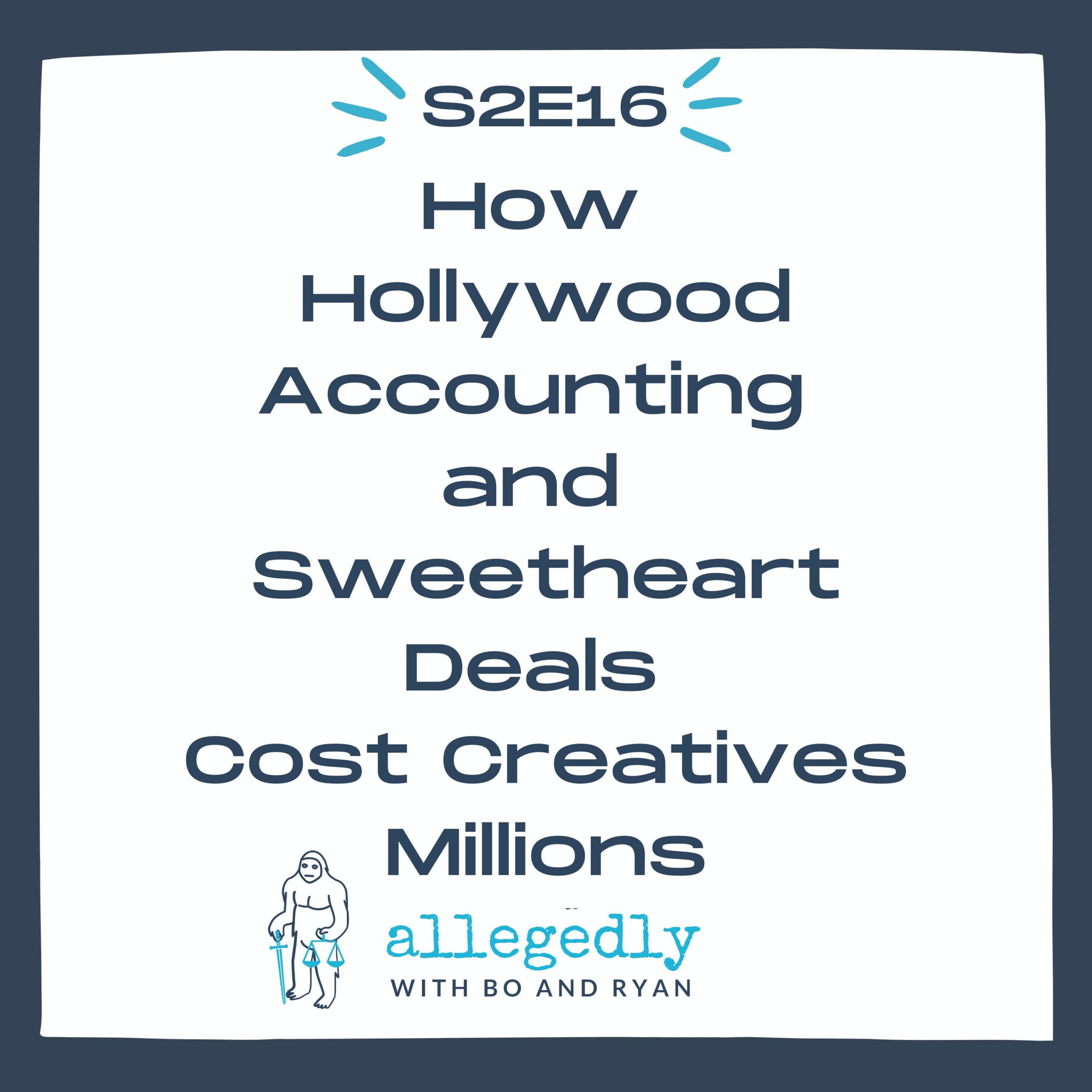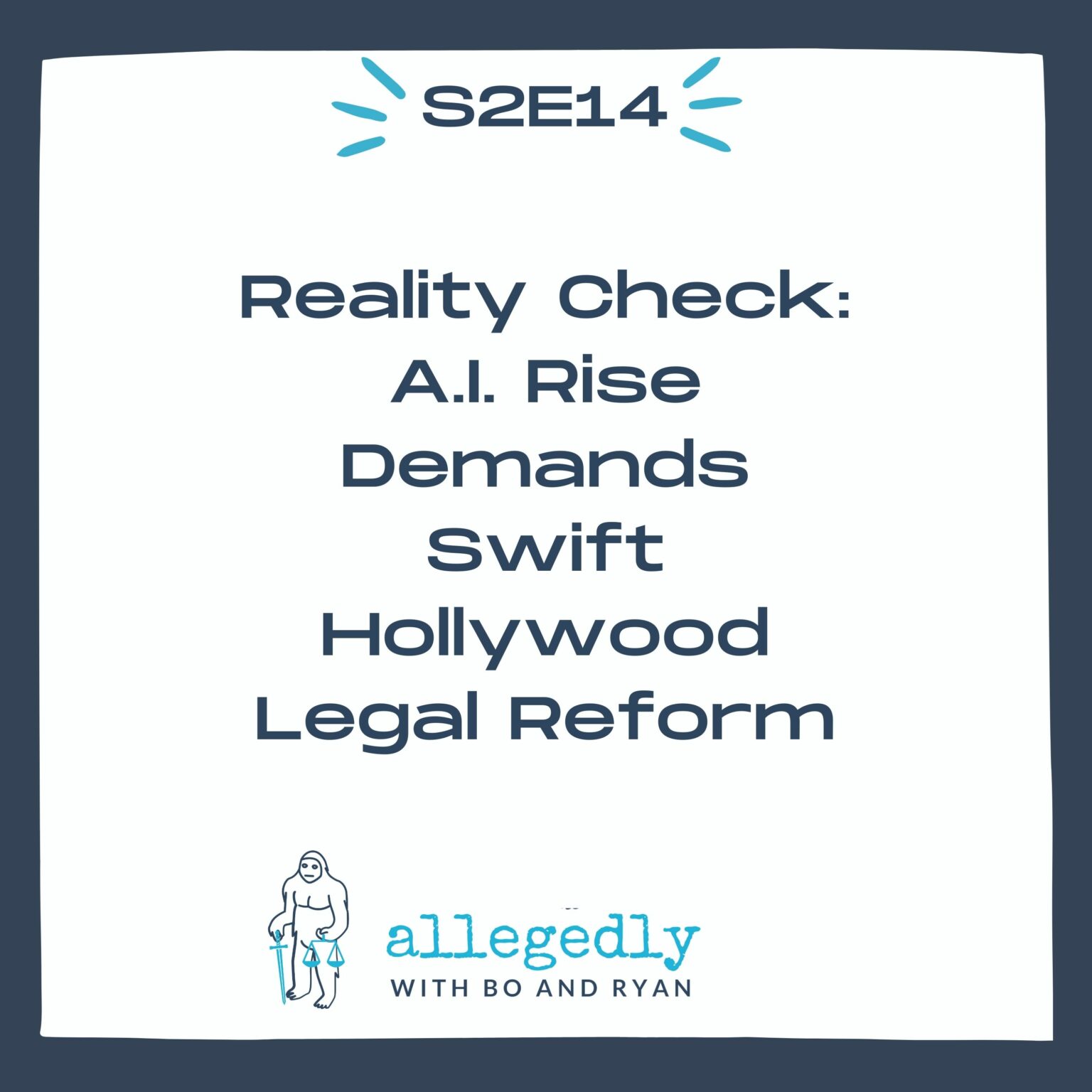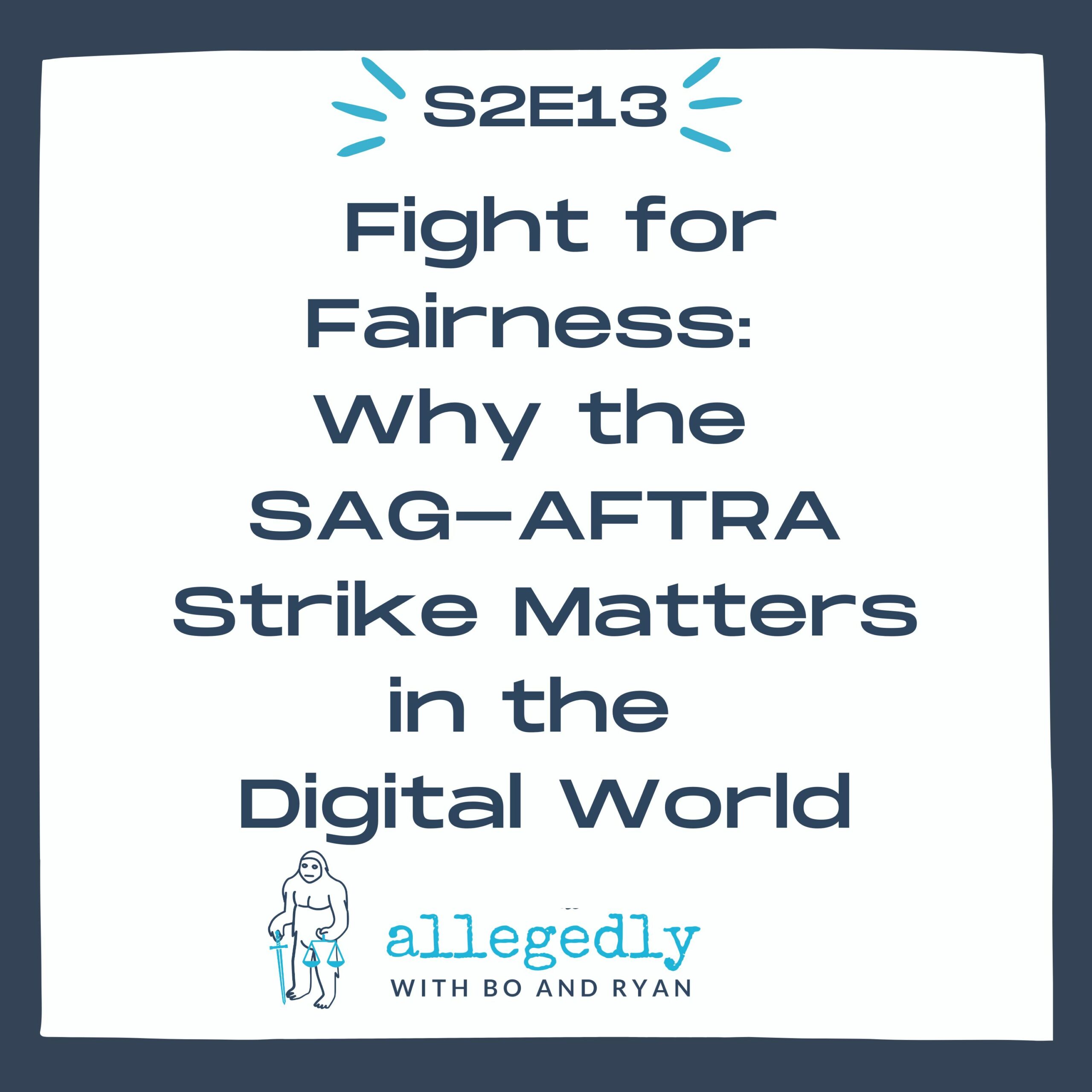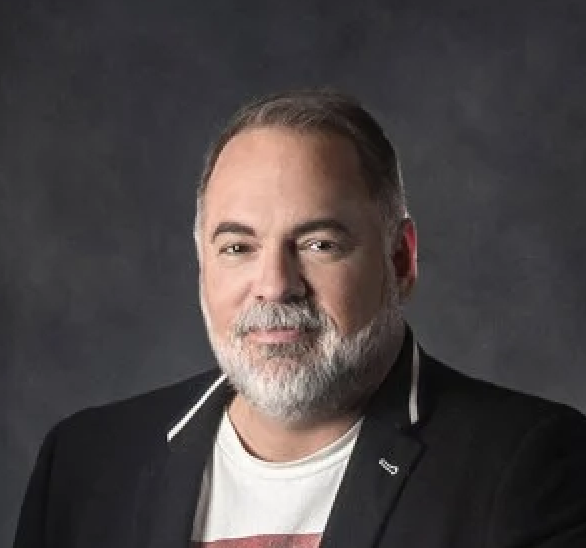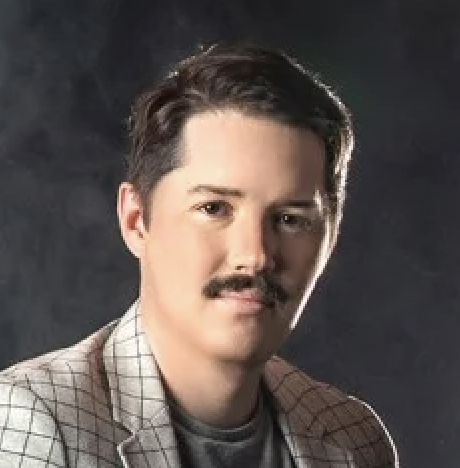allegedly with Bo and Ryan | Season 2 Episode 3
Today on the podcast, Bo and Ryan discuss Winnie the Pooh and the public domain… allegedly.
Allegedly… with Bo and Ryan Podcast S2E3| Transcript
Bo: [00:00:00] There were some lawyers on that production team that were probably monitoring that pretty closely, because one of the last things in the world you want is to get sued by Disney.
Ryan: [00:00:11] Welcome to Allegedly with Bo and Ryan, the only entertainment and law podcast that brings you the truth, the whole truth and nothing but the truth…
Bo: [00:00:20] Allegedly. I’m Bo Bowen.
Ryan: [00:00:22] And I’m Ryan Schmidt.
Bo: [00:00:24] You’re listening to Allegedly with Bo and Ryan. We’re coming to you from our law offices in beautiful, historic Savannah, Georgia, where we’ll be chatting about pop culture, hot legal topics in the news, and doing our best to change the way people think about the law and lawyers.
Ryan: [00:00:40] But first, a little about us. Bo has magical tears that could cure world hunger. Only problem is, he’s never cried.
Bo: [00:00:48] And Ryan is such a talented chef. He can cook minute rice in 30 seconds.
Ryan: [00:00:54] Together, we are Savannah’s consummate renegade legal titans, …
Bo: [00:00:58] and the only corporate and entertainment lawyers in the free world who have never lost a single case… Allegedly. Welcome to Season two, Episode three of Allegedly with Bo and Ryan. First, you know what, Ryan? I want to actually thank everybody who listens and subscribes to this show. I mean, I love the fact there are actually people out there who want to listen to us, two lawyers, friends, possibly lovers, talk about that wacky intersection of law and pop culture.
Ryan: [00:01:35] Well said, Bo, I would add that we’d love to hear from you, the listeners. If you ever have any questions or suggestions for future episodes, just please drop us a line on our contact page at bowenschmidt.com.
Bo: [00:01:47] Nice one. Ryan. Well, what I understand is that you have been super excited about today’s show. So what do you have in store for us today?
Ryan: [00:01:57] So you know this new horror movie that features Winnie the Pooh?
Bo: [00:02:03] I have definitely heard about that.
Ryan: [00:02:06] We’re talking about this very non-PG slasher, “Winnie the Pooh: Blood and Honey.”
Bo: [00:02:13] Well, first, I have two questions about this. First question, is it going to leave any Oscars for any of the other movies out there?
Ryan: [00:02:24] That’s a fair question.
Bo: [00:02:26] And two, how the hell did that movie ever get approved by Disney?
Ryan: [00:02:32] Well, that’s the question everybody was asking when they first heard about this crazy new project.
Bo: [00:02:36] I mean, I know I was.
Ryan: [00:02:39] I mean, I had to look it up even. I was like, how the hell did Disney decide to do this now? I mean, things are changing at Disney, right? I mean, now they’re going to do Deadpool movies and rated-R movies. And, you know, it’s turning a little bit, but not this far.
Bo: [00:02:56] Yeah, no doubt.
Ryan: [00:02:57] So it turns out this is all made possible thanks to the United States Copyright Act. The creators of the movie didn’t actually need to get these permissions because the character Winnie the Pooh entered the public domain January 1st in 2022.
Bo: [00:03:10] Well, I mean, how how does that work? How did that happen?
Ryan: [00:03:14] So under the Copyright Act, whether we’re talking about the 1976 Copyright Act, that’s the current law or the 1909 Copyright Act that governs all works between 1909 and 1976, We’ve got certain term limits on these copyrights, right? So under the current act, you’ve got copyrights from the date that you create it, your whole, life plus 70 years.
Bo: [00:03:39] Okay. It’s kind of a moving target.
Ryan: [00:03:41] Exactly. But under the old act, which a lot of these works that are now expiring fall under, you’ve got 95 years from the date of first publication.
Bo: [00:03:51] Gotcha.
Ryan: [00:03:53] So after that, you’re going to be entering what’s known as the public domain, which means that these rights have expired and anybody is going to be free to use it without license, without permission. And this is a good thing for works. But it’s bad for the person who created it that wants to be able to profit from it. You no longer have that monopoly. But you know, beneficially we’re talking about community theaters can now screen films, youth orchestras can now perform music publicly without needing a license. There’s a lot of benefits to things entering the public domain.
Bo: [00:04:26] I mean, that makes sense.
Ryan: [00:04:28] And so the work here in this Winnie the Pooh movie, the book Winnie the Pooh by A. A. Milne, was first originally published in 1926, which means that it was protected up through December 31st, 2021, the 95th year. So this means that any characters, artwork or other protected expression in that book are now free for anybody to use in any way they want, but with some important limitations.
Bo: [00:04:56] Well, right. I was actually going to say that because actually I read a really interesting article about this on Vulture.com, about Blood and Honey specifically. And it was talking about how the creators had to be ultra careful only to use details from the book and stay far away from the Disney movie itself. So can you kind of explain why that was so important?
Ryan: [00:05:22] Oh, absolutely. I mean, you can only include the storylines, characters, outfits, phrases and stuff, that were in that original work. If it was if it was in the Disney work that was later created that is still subject to its own copyright. That’s new expression.
Bo: [00:05:40] Gotcha. So they can’t touch that movie. They got to stick with that book. So I’m going to guess that there were some lawyers on that production team and were probably monitoring that pretty closely because one of the last things in the world you want is to get sued by Disney.
Ryan: [00:05:58] And just like how how little of a detail would be necessary to pull something like that, just just just using one phrase like the “Oh Brother” or something that Disney created, that wasn’t part of the book.
Bo: [00:06:10] Right, or even the color of clothing. Any little detail, I would think so. Well, you know, given how many headlines this movie has made, I have to think that that is going to be a strategy that’s going to be repeated in the future. I mean, you’re talking about a low budget horror movie. If you take away the Winnie the Pooh connection, this was as low budget as you can get as let’s be honest, probably as shitty as you can get, of a movie, and it was definitely would just go direct to streaming. Straight to Redbox. It’s now been picked up by a major distributor and it’s enjoying a limited theatrical release. So why wouldn’t you do that? I mean, you know, the budget of this movie, “Winnie the Pooh: Blood and Honey,” Ryan?
Ryan: [00:07:01] No.
Bo: [00:07:01] The budget of that movie was actually less than $100,000. That’s the budget of this movie. Literally, that Japanese toilet that you installed in the corner of your office over there, Ryan, That costs more than this movie.
Ryan: [00:07:19] Fair enough.
Bo: [00:07:20] So and it has already made about $3.5 million, so make it a return of 35 times your budget. That’s pretty good. So I could see why that’s going to be attractive to other people, you know, wanting to make movies out of these public domain things in the future.
Ryan: [00:07:40] Yes, I do get the sense, though, that you only get a few good strikes at this thing. This was so effective because it was the first of this kind, right. Like, I don’t think everybody that tries to create a public domain thing is going to have that same type of fanfare and excitement.
Bo: [00:08:01] Well, I mean, I wouldn’t even say it’s the first because something similar happened back when Netflix got sued back in 2020 when they released the movie Enola Holmes. They got sued by the estate of Arthur Conan Doyle, who was the author of the Sherlock Holmes novels. So, all right. Let me give some background on this. So, back between 1887 and 1927–So you’re talking about about a 40 year period–Sir Arthur Conan Doyle wrote 62 Sherlock Holmes stories, four novels, 58 short stories.
Ryan: [00:08:41] Good Lord.
Bo: [00:08:42] And don’t worry, I’ll do a spoiler alert if I’m going to give away any of the details. So now the Netflix movie Enola Holmes, it focused on Sherlock Holmes’s sister, who was a completely new character, who never appeared in a single one of Doyle’s stories or books. Now, despite the fact that 52 of the 62 Sherlock Holmes stories were already in the public domain when this movie’s released, this lawsuit argued that those last ten protected stories created between 1923 and 1927 portrayed Sherlock Holmes in kind of a different light. He was more empathetic. He was more human. So [while] Netflix didn’t copy any actual story, they sued them because they said they copied kind of the later vibe of Sherlock Holmes.
Ryan: [00:09:45] His flair.
Bo: [00:09:46] Exactly. Well, Netflix turns around. They immediately file a pretty masterful response via motion to dismiss, arguing that the Doyle estate was trying to impermissibly extend copyright to Holmes’s character indefinitely and that character attributes like, you know, warmth and kindness, those just simply aren’t protectable elements. You can protect the story. You can’t protect a vibe. We’ll never know how the court would have actually ruled on the case because it was actually quietly settled before a ruling could be made on the motion. But, you know, I always thought the timing was actually kind of interesting there, because Netflix could have avoided any potential copyright lawsuit altogether had it just waited three more years to make the movie.
Ryan: [00:10:39] At which point all those works would have been in the public domain, right?
Bo: [00:10:42] Absolutely. So, all right, music man. I mean, you know, I mean, we’ve talked about movies. Have there been any of these kind of public domain disputes in the music arena?
Ryan: [00:10:54] Oh, yeah. I mean, I got a big one, and I’m talking about the 2016 Happy Birthday case.
Bo: [00:11:03] Are you serious?
Ryan: [00:11:04] There was a case about the Happy Birthday song.
Bo: [00:11:08] I feel like the Happy Birthday song had to have been around for at least 10 million years.
Ryan: [00:11:14] It’s definitely true. So here’s what this case is all about. What you may or may not know about this song is that for nearly a century, the music publishing arm of Warner Brothers has claimed ownership of the song. For decades, they’ve collected money through royalties and licenses for people to use and publicly perform. Happy Birthday. That’s exactly why chain restaurants like TGI Fridays and Applebee’s started coming up with their own songs.
Bo: [00:11:43] Oh, are seri- ..Uh, okay. I got to interrupt you, Ryan, because you were just bringing up a painful memory for me.
Ryan: [00:11:51] Oh, wow.
Bo: [00:11:52] Okay, so back when I was in college, back in the 90s, I actually worked as a waiter at Bennigan’s for a while, and we had one of those songs. Oh, yes, we had the “Bennigan’s Birthday Song,” and I never knew that’s why we had to perform this ridiculous song as opposed to just singing Happy Birthday.
Ryan: [00:12:15] Because Bennigan’s was too cheap to pay Warner Brothers the royalty.
Bo: [00:12:20] I would have had no idea that “Happy Birthday” was subject to copyright protection. That seems insane.
Ryan: [00:12:26] Well, now, now, you know, the next thing I’m going to make you do. What was that Bennigan’s song?
Bo: [00:12:32] Oh, my God. Well, first of all, picture it. Okay, so here you have this group of like, you know, I don’t know, ten servers, other employees, and they’re like, oh, it’s someone’s birthday. You all have to gather around and you have to come up with your faux excitement and your big smile on your face. Right. And I remember you’d have to look and say, “okay, we’re here to sing the happy birthday song to you. Do you want the regular version, the short version or the backwards version?” Well, obviously no one ever said the regular version. So if they said the short version, you had to drop to your knees to sing the song.
Ryan: [00:13:15] Oh, my God.
Bo: [00:13:16] And if they said the backward version, everybody just had to turn their back on the person to sing their song. Welcome to working at Bennigan’s, ladies and gentlemen. And all of us clapped and it was, “Happy, happy birthday. This is your special day. Happy, happy birthday is what we’re here to say. Happy, happy birthday. May all your dreams come true. Happy, happy birthday From Bennigan’s to you. Hey!” That will haunt me to my grave.
Ryan: [00:13:45] So that humiliation could have all been avoided with a simple license.
Bo: [00:13:51] If Bennigan’s was still around, I would sue the hell out of them right now. Emotional distress.
Ryan: [00:13:58] Well, there is a lawsuit related to the Happy Birthday song and birthday songs in general. What this case was about here was this super tiny documentary filmmaker that challenged Warner Brothers ownership and brought this whole thing tumbling down. Okay.
Bo: [00:14:16] I’m a fan.
Ryan: [00:14:17] It all started when Jennifer Nelson wanted to be working on this documentary about the history of the Happy Birthday song. Sounds kind of boring, but, you know, whatever. I mean, there’s there’s been worse documentaries out there for sure. So obviously that film would have been impossible to make without performing the Happy Birthday song. At some point. You can’t be talking about it without playing it, right? Well, Warner wanted a modest license of $1,500 for Nelson to include it in the film, which honestly isn’t a bad deal.
Bo: [00:14:51] No, that is not much money.
Ryan: [00:14:53] That’s not a lot of money. I would if somebody called me and said, Warner wants this much money for a license to do it, I’d say, cool, because you’re at the mercy of whoever owns the rights. They could say it’s $1 million. They set the price and you’re either going to take it or leave it. 1500 bucks? Really, not that bad. Well, she doesn’t take the license, okay? Instead, she hires a legal team to challenge Warner Brothers ownership of the song outright. Her argument is that because of the age of the work, and based on the original authors failure to follow the strict publication requirements under the 1909 Copyright Act, the song was already in the public domain and she was able to use it license free. More importantly, according to Nelson, Warner never actually acquired the rights from the original author. One day they just simply declared they owned it.
Bo: [00:15:50] Yeah, we’ve heard similar stories of that before.
Ryan: [00:15:52] And my guess there is that these things were so old that if there was some type of contractual assignment, it was probably long gone. Right? And that’s that’s fair. We run into that all the time. Well, Warner argued that they held a valid copyright in the song and that it would be protected until at least 2035. But things took a turn when, at a pretrial motion hearing, the federal court stepped in and indicated that it thought Warner’s ownership was invalid and that Warner should potentially be sanctioned for collecting royalties and licensing fees for nearly a century.
Bo: [00:16:31] Ouch.
Ryan: [00:16:33] So rather than wait for trial and risk being sanctioned, Warner’s agreed to settle the case via a consent judgment for $15 million.
Bo: [00:16:42] Good Lord.
Ryan: [00:16:43] And they estimated that that was the amount of money that they would receive in licenses from the date of that case up through 2035. So they pay this money. And then as part of that judgment, Warner also conceded that “Happy Birthday” was in the public domain and that they would make no further claim of ownership. My guess is that they did the math on what they would have earned and figured they just got to quit while they’re ahead.
Bo: [00:17:06] Yeah, no doubt. I mean, good news for all waiters at shitty theme restaurants going forward. Well, I got to say, Ryan, while you were telling me that story, I got kind of curious, and I just googled what famous works are entering the public domain and what’s going to join them in 2024 and 2025. You got any guesses?
Ryan: [00:17:32] Well, there’s one that I know is definitely on the chopping block, and that’s Mickey Mouse, on the list. At least his original design. Interestingly enough, Disney, through its lobbying efforts over the years and its desire to protect Mickey Mouse, is one of the reasons older copyrights actually last for 95 years. The 1909 act first gave authors only 28 years total. It was 14 years. And then you have to renew it for another 14 years, up to 28 years. But as you can imagine, year 26 and year 27 was getting close, and Disney said, “hey, Congress, we need a we need to make this a little bit longer.” And so they extended it, and they extended it, and they extended it. And finally, back in 2019, Congress said, “we’re not extending this thing anymore.” So so, Mickey, at least as we know him in the original Steamboat Willie version, is going to be entering the public domain next year.
Bo: [00:18:32] Yeah, but, you know, I think just like the the later versions of Winnie the Pooh, people aren’t going to be able to use all those later iterations of Mickey that are still protected, you know, like like Wizard Mickey from Fantasia. You know, I mean, these it can get pretty tricky to navigate, actually. So if you are going to do something like that, maybe call an entertainment lawyer.
Ryan: [00:18:55] It doesn’t doesn’t hurt.
Bo: [00:18:57] If only we knew someone like the Bowen Law Group.
Ryan: [00:19:01] What? So in the past few years, a new little unofficial holiday has emerged, on January 1st of each year, known as Public Domain day.
Bo: [00:19:14] I heard about that because, you know, the first time anybody ever paid any real attention to that, was 2021. Right? Becausethat was the first year that the 95 years had passed since the institution of the act. Right?
Ryan: [00:19:31] Right, exactly. So one of the one of the first big works that entered the public domain was The Great Gatsby. You know, And then in 2022, the copyright for works such as the original Winnie the Pooh, as we’ve already talked about, and the original Bambi book also expired, which again, you know, we’re talking about the book. We’re not talking about the Disney created cartoon, right?
Bo: [00:19:53] Thus far, no Bambi slasher movies that we’re aware of. But just two months ago at the start of 2023, the last of Sherlock Holmes stories, the film Metropolis, of course, and even the song “Puttin on the Ritz,” they all entered the public domain.
Ryan: [00:20:14] So what does that mean for people that would want to use that work?
Bo: [00:20:18] Well, it means you’ve got free access to it as long as you don’t infringe upon any later versions that came along. Like, you know, I know that [for] “Puttin on the Ritz” there was a remake in the 80s, by maybe like Falco or somebody like that. But so you can’t use that one. But the original is fair game, right?
Ryan: [00:20:40] Yeah. And so the original, the original recording, the original composition, you can create your own thing, but you’re not going to be able to just start using this 1980 sound recording for whatever reason you want because that’s still got its own copyright to that.
Bo: [00:20:54] Right. Or the Young Frankenstein version? Exactly.
Ryan: [00:20:59] Well, looking forward to next year, in 2024, the public domain will, of course, gain the Steamboat Willie version of Mickey Mouse, as well as the very first version of Minnie Mouse from the “Gallopin Gaucho,” and then Tigger as he first appeared in the sequel to Winnie the Pooh, the “House on Pooh Corner,” and many more other characters. Which means, I mean, are you thinking what I’m thinking?
Bo: [00:21:21] What’s that?
Ryan: [00:21:22] Blood and Honey 2.
Bo: [00:21:23] Oh, “Tigger’s Revenge.” I like it.
Ryan: [00:21:29] And if you can wait until 2025, you’ll be able to use Popeye the sailor man, to which I say shiver me timbers.
Bo: [00:21:36] Toot toot. Sounds like any law firm that hears they have to go up against The Bowen Law Group.
Ryan: [00:21:42] Exactly. Bo Which is why we are the most successful lawyers in the history of human jurisprudence, …
Bo: [00:21:49] Allegedly.
Ryan: [00:21:49] Well, that’s our show for today. Thanks for listening to the legal mastery of the highly intelligent and easily most attractive true legal outlawyers in Savannah. And remember the only lawyers in the free world who have never lost a single case … Allegedly. To continue to receive free edge of your seat legal anecdotes, mind blowing takes on hot topics, and a general masterclass in awesomeness, please head over to bowenschmidt.com/podcast and …
Bo: [00:22:11] look dude, that’s it. Anybody who hasn’t hit the subscribe button by now is officially being thrown in the public domain.








